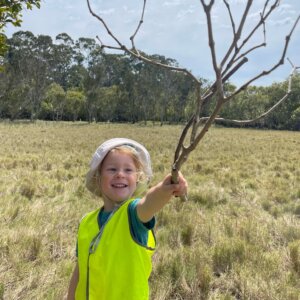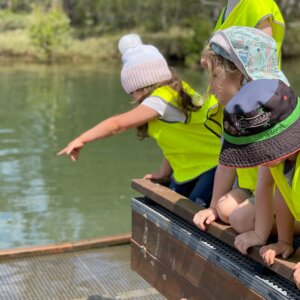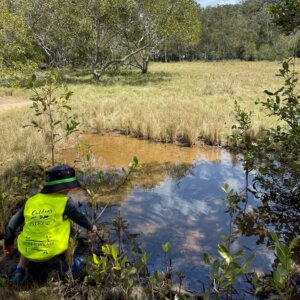As parents and as educators, it’s our job to keep children safe. For children, it’s their job to explore, push limits, move their bodies, and happily tune out what they don’t want to hear.
So when a child is engaging in risky play – which is so important in a child’s development as it furthers their frustration tolerance, critical thinking skills, self-confidence, resilience and so much more – it can also put the watching adult into panic mode, often triggering the phrase ‘be careful!’
But, if that adult expects the child to immediately stop what they’re doing after uttering (or shouting) those two words, they probably have another reality coming. ‘Be careful’ isn’t terribly effective because it’s vague and lacks specificity for a toddler. Saying it on repeat will likely lose any small amount of effectiveness it did carry because, well, being told to be careful isn’t any fun. Or worse, hearing that phrase could create fear and dim a child’s curiosity and sense of adventure.

As adults, we also need to think about what we mean when we say ‘be careful’. Do we want the child to stop what they’re doing? Do something differently? Slow down? Do we think they will get hurt? Every situation is different, but it’s worth thinking about the intention behind the phrase. Is it possible the child could get seriously hurt? Is what the child is doing put another child at risk? Is there something valuable that you don’t want damaged?
Perhaps rather than ‘be careful’ you say:
‘Looks fun, just watch out for your little sister!’
‘Do you hear the cars? The road is close by.’
‘Before you throw that stick, just watch for the window over there.’
‘Do you feel safe?’
‘I’m here if you need me.’
‘Maybe just slow your body down a little bit.’
‘Focus on where your feet are.’
‘Using two hands might help you hold on tighter.’
‘What’s your plan for coming back down?’
Even just asking ‘does your body feel safe?’ may give your little one a second to pause and think about what they’re doing, and perhaps change course if needed.
For adults, when they observe children participating in risky play, if they approach it with curiosity and give specific feedback that focuses on creating awareness and problem-solving skills, it helps your toddler becomes more confident in their skills, abilities, problem-solving and learning.

Risky play is something to be encouraged. Something happened between the time when many parents of small children were little ones themselves, to now. We may remember our parents letting us go play unsupervised, as long as we were back before dark. That play may be some of your best childhood memories. Society has become more risk-adverse in recent decades, from parents worries about kidnapping and injury, to the fear of judgement from others thinking they’re bad caregivers can drive many parents to intervene before their child can engage in risk during play. But those fears could actually be hurting children’s development by hovering over them constantly. Research shows that engaging in risky play can actually reduce the risk of injury, too. Something parents and educators can do is teach young children to risk-assess.
For example, rather than worrying about if your child is going to get a sharp bindi seed in his or her foot from running across grass barefoot, involve your child in the risk assessment. In this case, point out what a bindi weed looks like, and encourage your child to look for the weeds with shoes on before deciding if it’s a good idea to take shoes off. By assessing ‘risk’ situations together, your child will learn increased ability to hypothesize, predict, experiment and investigate, and your child will feel you trust their ability to make safe decisions. it’s all about balancing the risk with the benefits. Imagine if your child was running barefoot in the grass and you spotted bindis and yelled ‘Be careful!’ your child could be bewildered by your cry, ignore your yelling and keep going, or could possibly stop, landing perfectly on the sharp weed you want him or her to avoid.

At Little Scholars, risk assessment is a part of our programming, such as bush/bush kindy or loose parts play, where children have the opportunity to guide and direct their own learning tying in with activities that are child-led and learning is a process of discovery. Sites are pre-risk assessed by educators, and children are involved in the risk management process, guided to look out for themselves and have a group discussion about it before play.
“It’s all about setting boundaries with the children and asking them about what risks they think may be involved before they go ahead,” says Melanie, operations manager for Little Scholars. “We wouldn’t use ‘risk’ with little ones, so it may look like ‘how can we be safe when we play in this area?'”
“Play is a powerful behaviour that is often a missed agenda for many early childhood professionals. Extrinsic agenda will often lead to children being told what they should experience, as opposed to living the experience, says Susan, Little Scholars’ pedagogical leader and practice manager.
Susan highlights Lev Vygotsky’s theory of play as a lived experience.
“Too often, adults feel the need to apply an adult agenda, often with good intention, however this often has the potential to limit the actual multifarious nature of what we call play.
“As adults, we need to trust in the play process and accept that children will create situations in which they can act out emotions in ways they feel they can. When given the freedom to do so, children will demonstrate ability for exploration, imagination, and decision-making.”
Related:
Let us hold your hand and help looking for a child care centre. Leave your details with us and we’ll be in contact to arrange a time for a ‘Campus Tour’ and we will answer any questions you might have!
"*" indicates required fields
Let us hold your hand and help looking for a child care centre. Leave your details with us and we’ll be in contact to arrange a time for a ‘Campus Tour’ and we will answer any questions you might have!
"*" indicates required fields